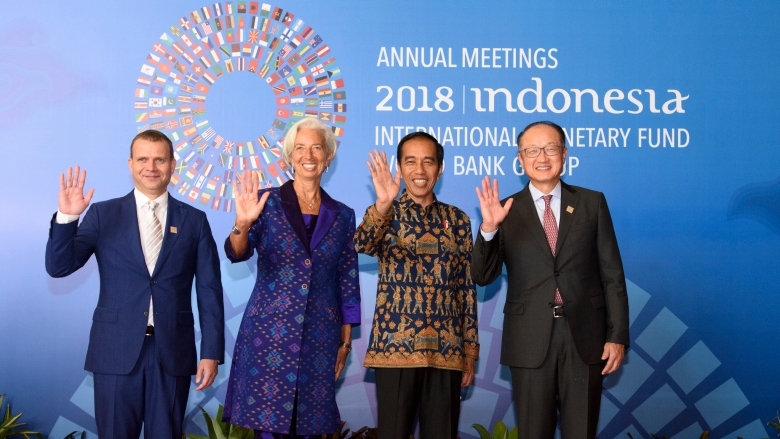The World Bank Group is helping member countries address these challenges, through a combination of financial assistance and policy advice to promote robust and inclusive economic growth, reduce risks, and foster competitiveness, while strengthening fiscal sustainability and financial resilience.
This was a key message from the Development Committee, a ministerial-level forum of the World Bank Group and the International Monetary Fund, in a communiqué issued at the close of the institutions’ Annual Meetings in Bali, Indonesia. The committee, which represents 189 member countries, expressed concern about rising debt in some emerging markets and low-income countries. Shareholders asked the Bank Group to work with the IMF and help countries strengthen fiscal positions by improving debt management capacity, increasing domestic resource mobilization, and deepening local capital markets. The committee also underlined the crucial role of international trade for growth, job creation, and sustainable development.
The institutions convened just as Indonesia grapples with natural disasters in Lombok and Sulawesi. In his opening speech, World Bank Group President Jim Yong Kim stressed the need to build resilience to such disasters and to tackle the climate shocks that exacerbate them. On a range of crises as well as long-term economic transformations that are affecting developing countries, he said, “We have to agree on ways forward in tackling the biggest challenges our clients face.”
The communiqué and Kim’s speech cited the critical importance of building human capital, particularly given how technological advances affect jobs, the financial sector, and other aspects of development. , as part of a broader global Human Capital Project that supports long-term, measurable progress toward better outcomes in education, health, nutrition, and social protection.
This is the focus of the World Development Report 2019: The Changing Nature of Work, also released at the meetings. Both Kim and the committee noted that technology can help speed progress on the Bank Group’s twin goals of eradicating extreme poverty and boosting shared prosperity. But accelerating innovations also pose risks, particularly where they create new jobs and markets but render others obsolete.
The committee expressed support for joint work across the World Bank, the International Finance Corporation (IFC), and the Multilateral Investment Guarantee Agency (MIGA) in pursuing private sector solutions where these can help achieve development goals, while reserving public finance for projects that the private sector cannot support. It also reiterated support for IDA, the Bank Group’s fund for the poorest countries, and noted key features of IDA’s current funding cycle: the Private Sector Window, a partnership with IFC and MIGA to stimulate private investment in low-income and fragile countries, as well as IDA’s entrance into international capital markets through a highly successful initial bond issue.
As Kim’s speech noted, the meetings offered a chance to share new ideas and approaches that can accelerate progress on the Bank Group’s twin goals: to end extreme poverty by 2030 and to boost shared prosperity among the poorest 40 percent of people worldwide. Despite impressive gains in recent years, however, Kim highlighted the “stark reality of the human capital crisis.” And while technology can yield innovative solutions to reduce poverty and inequality, it can also raise the risk of instability. Where people aspire to a better life that they know of elsewhere but have no way to achieve, frustration can lead countries down a path to fragility, conflict, violence, extremism, and migration.
But understanding these global challenges is a key to solving them: in Kim’s words, “The good news is that we know more than ever about helping countries prepare for this future.” Equipped with this knowledge, he added, “We have no excuse but to act – with the sense of urgency that this crisis requires – to invest in our people.”


